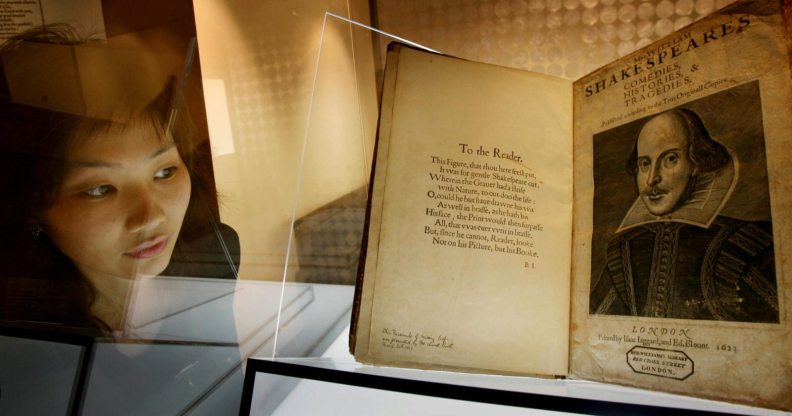William Shakespeare was probably gay, and the Victorians changed his work to hide the truth, says RSC boss

Hong Kong, CHINA: An employee of Sotheby’s auctioneers looks at a first folio edition of plays by William Shakespeare, the only surviving source for eighteen of his plays and one of the most important books in English literature in Hong Kong 25 May 2006. The book has an estimate at auction of 2.5 – 3.5 GBP millions pounds. (4.7- 6.5 million USD) AFP PHOTO/MIKE CLARKE (Photo credit should read MIKE CLARKE/AFP/Getty Images)
The director of the Royal Shakespeare Company (RSC) has said that famous playwright William Shakespeare may well have been gay.
Artistic director Greg Doran confirmed long running rumours that the playwright was likely to be homosexual.
Doran also said that a number of plays written by Shakespeare include LGBT characters, which the company can no longer ignore.

Speaking to BBC Radio 4, the expert stressed that it was “no longer acceptable” to conceal the sexuality of some of Shakespeare’s characters.
Doran explained that since he started working with the RSC in 2012, he has become well acquainted with the famous works.
This in depth relationship Doran has with the Shakespeare works has given him another level of understanding of the 17th-century bard, who Doran believes was an “outsider”.
He said: “I guess a growing understanding of Shakespeare as I have worked with him over the many years that I have, makes me realise that his perspective is very possibly that of an outsider.
“It allows him to get inside the soul of a black general, a Venetian jew, an Egyptian queen or whatever and that perhaps that outsider perspective has something to do with his sexuality.”
Doran said that he drew the conclusion of Shakespeare’s sexuality from the sonnets he wrote.
“He wrote a cycle of 154 sonnets, which were published in 1609, and 126 of those sonnets are addressed to a man and not to a woman,” Doran explained.
Academics found that the sonnets went through “a process of hetero-sexualisation” during the Victorian era as pronouns were altered and so the meaning of the sonnets were changed.
Doran added that the changes probably stemmed from people who wanted to deny Shakespeare’s sexuality as the great national bard.
“It wasn’t somehow quite kosher for the great national bard to possibly have affections for his own sex and therefore that process, to kind of whitewash through the sonnets,” he said.
As well as the sonnets being a nod to the writer’s sexuality, Doran explained that some key characters are without a doubt gay, despite not being played as gay.
However other experts have refuted the claims.
Sir Brian Vickers, a visiting professor at University College London, wrote to the Times Literary Supplement, saying the claim was an “anachronistic assumption” because experts now accept that some forms of rhetoric allowed men to express love in a way which does not mean sexual attraction.
Continuing, Vickers said that it was futile to suggest that there was anything biographical in the sonnets, as Shakespeare wrote professionally under a “poet-persona”.
Back in 2012, Sir Ian McKellen said: “I’d say Shakespeare slept with men.
“The Merchant of Venice, centring on how the world treats gays as well as Jews, has a love triangle between an older man, younger man and a woman.

“And the complexity in his comedies with cross-dressing and disguises is immense. Shakespeare obviously enjoyed sex with men as well as women.”
The RSC boss says example is the character Antonio in the Merchant of Venice who is “absolutely clearly in love with the young man Bassanio and sometimes that is kind of toned down”.
Rather than the pairs love being portrayed on stage, they are shown to be very close friends, just “chaps” who are “very fond of each other”.
Dorran stressed that it was important that RSC and other Shakespeare production companies begin to portray the characters as the writer had intended.
“It’s (Antonio) clearly a very particular portrait of a gay man and I think in the 21st century it’s no longer acceptable to play that as anything other than a homosexual.
“I am just aware how many times Shakespeare has gay characters, and how sometimes those gay characters are not played as gay, and I think in the 21st century that’s no longer acceptable.”

